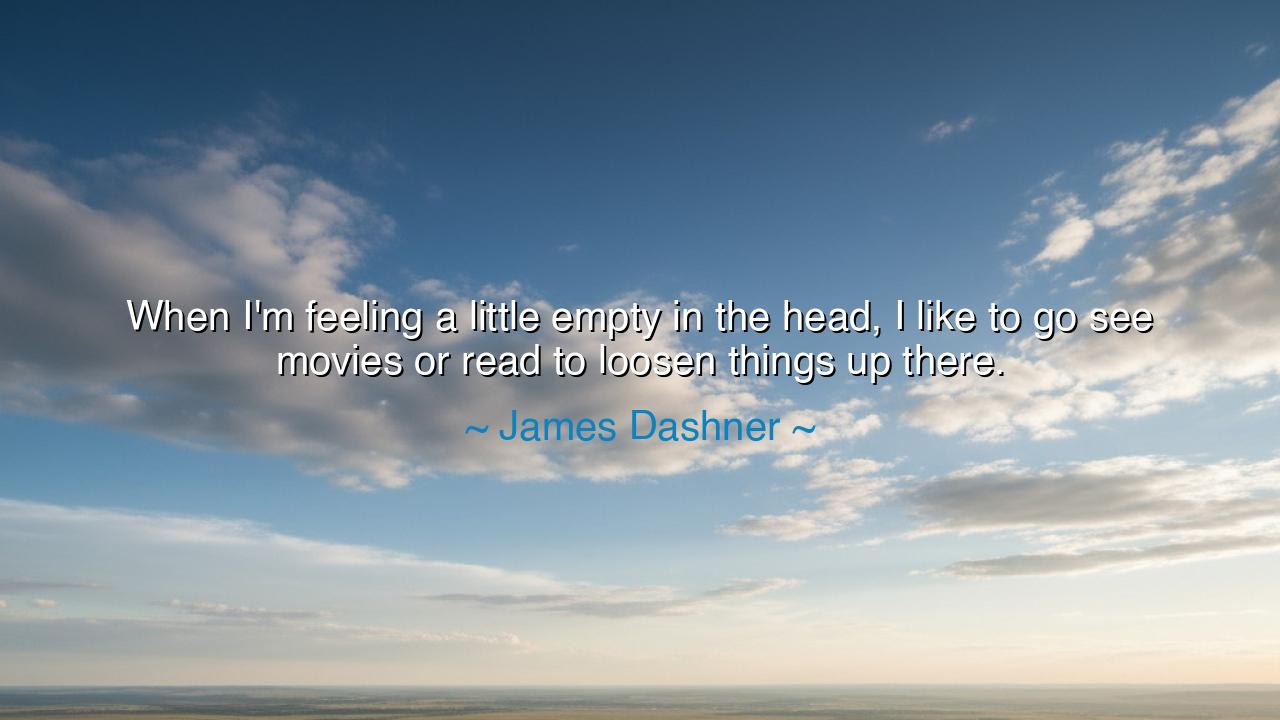
When I'm feeling a little empty in the head, I like to go see
When I'm feeling a little empty in the head, I like to go see movies or read to loosen things up there.






Ah, the words of James Dashner, who, in his humble reflection, speaks of a truth that resonates deeply within the human experience: "When I'm feeling a little empty in the head, I like to go see movies or read to loosen things up there." In this, Dashner reveals the importance of rest and renewal for the mind—a vital need for every thinker, creator, and seeker of wisdom. In times when the mind feels cluttered or barren, it is not a matter of forcing more thought, but of allowing oneself to open the gates to new sources of inspiration and creativity. Like the great philosophers and storytellers of old, Dashner understands that the act of immersing oneself in stories—whether through the moving images of film or the written words of books—can help to clear the fog that clouds the mind and renew the spirit.
In the ancient world, the great philosophers understood the importance of balance—between thought and rest, between action and contemplation. Socrates, with his method of questioning, was not constantly engaged in formal dialogue; he knew the need for quiet reflection, for allowing the mind to digest the thoughts and ideas that flowed through him. Similarly, Aristotle recognized that in order to reach true understanding, one must also allow for time to process and rejuvenate. Dashner’s practice of turning to movies and books in moments of mental emptiness is a modern reflection of this ancient wisdom—the recognition that sometimes, to think clearly, one must first let the mind wander and absorb new influences.
Consider the ancient Greek bards, whose stories were passed down not only through spoken word but through the deep emotional connection they created in their audiences. The epics of Homer, with their grand tales of gods and heroes, were not simply entertainment; they were a means of clearing the mind, of loosening the inner turmoil and restoring clarity to the heart and soul. When the warriors of Greece returned from battle, weary and filled with the burden of their experiences, they often turned to stories to ease their hearts and minds. Dashner’s words echo this ancient practice—to find rest and rejuvenation not in silence alone, but in the stories that stir the imagination and bring new perspectives.
This concept of mental renewal through stories is not just limited to the ancient philosophers or bards; it also rings true for the greatest artists and creators throughout history. Consider Leonardo da Vinci, the polymath who, despite his genius, understood that the mind requires not only study but also play. Da Vinci would often take breaks from his intense work to sketch freely, explore new ideas, or simply let his mind wander. These moments of relaxation, of immersion in something other than his primary tasks, allowed him to return to his work with fresh eyes and a renewed spirit. Dashner, like da Vinci, understands that it is through engaging with other forms of creativity that the mind finds new ways to flow and unwind.
In Dashner's reflection, we also find a powerful lesson about the human need for external inspiration. The ancient Greeks often spoke of the muses, divine beings who would inspire poets, musicians, and artists to create their greatest works. The muses were seen as a necessary force that brought new ideas into the minds of creators. For Dashner, that muse comes in the form of movies and books—works that unlock his imagination and allow him to return to his own creations with renewed energy and insight. This speaks to a deeper truth: the importance of external sources of inspiration in our lives. We are not meant to create in isolation, but to draw from the well of stories, experiences, and works that have come before us.
Thus, the lesson is clear: nourish the mind with things that inspire, relax, and rejuvenate it. When the mind feels empty or burdened, allow it the space to breathe, to engage with new ideas, and to replenish itself. Whether through stories in books, the moving pictures of film, or the wisdom passed down through the ages, we must recognize that mental clarity is often restored through engagement with what inspires us, not through forced effort. Just as the great philosophers found clarity in reflection and the ancient bards found renewal in their storytelling, we too must embrace the power of rest and rejuvenation through art and inspiration.
Therefore, take the time to refresh your mind. When faced with mental fatigue, do not force yourself into more thoughts, but turn to those sources of inspiration that bring joy, perspective, and renewal. Allow yourself to be guided by the wisdom of Dashner, and the great thinkers before him, who understood that the mind thrives on inspiration, and sometimes, it is the simple act of stepping away and allowing new ideas to flow in that leads to the greatest breakthroughs.






AAdministratorAdministrator
Welcome, honored guests. Please leave a comment, we will respond soon